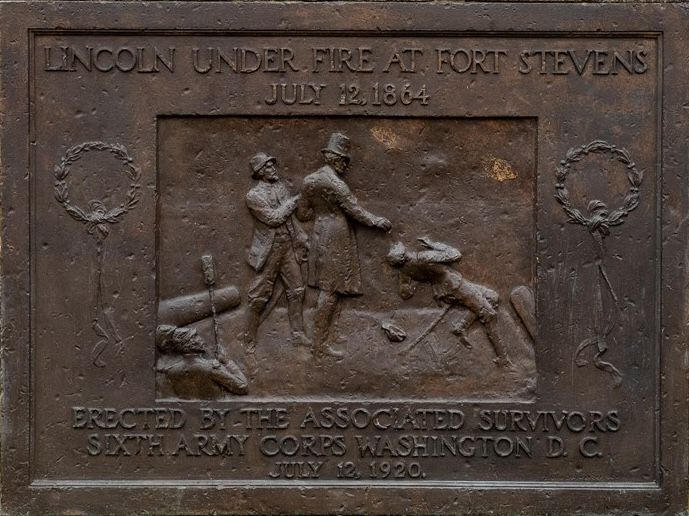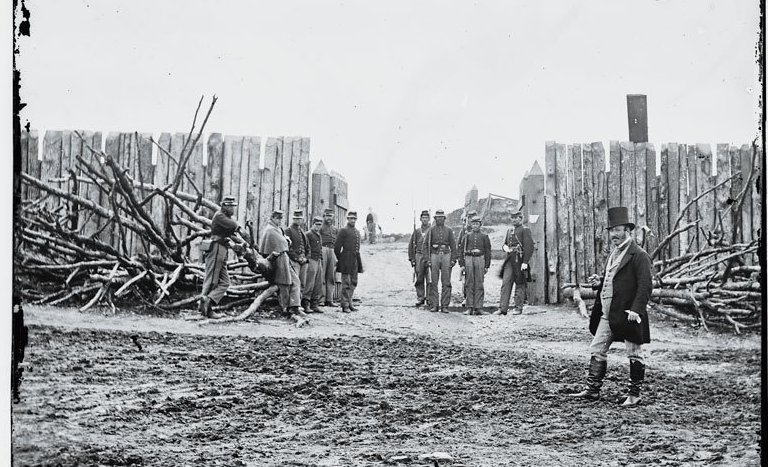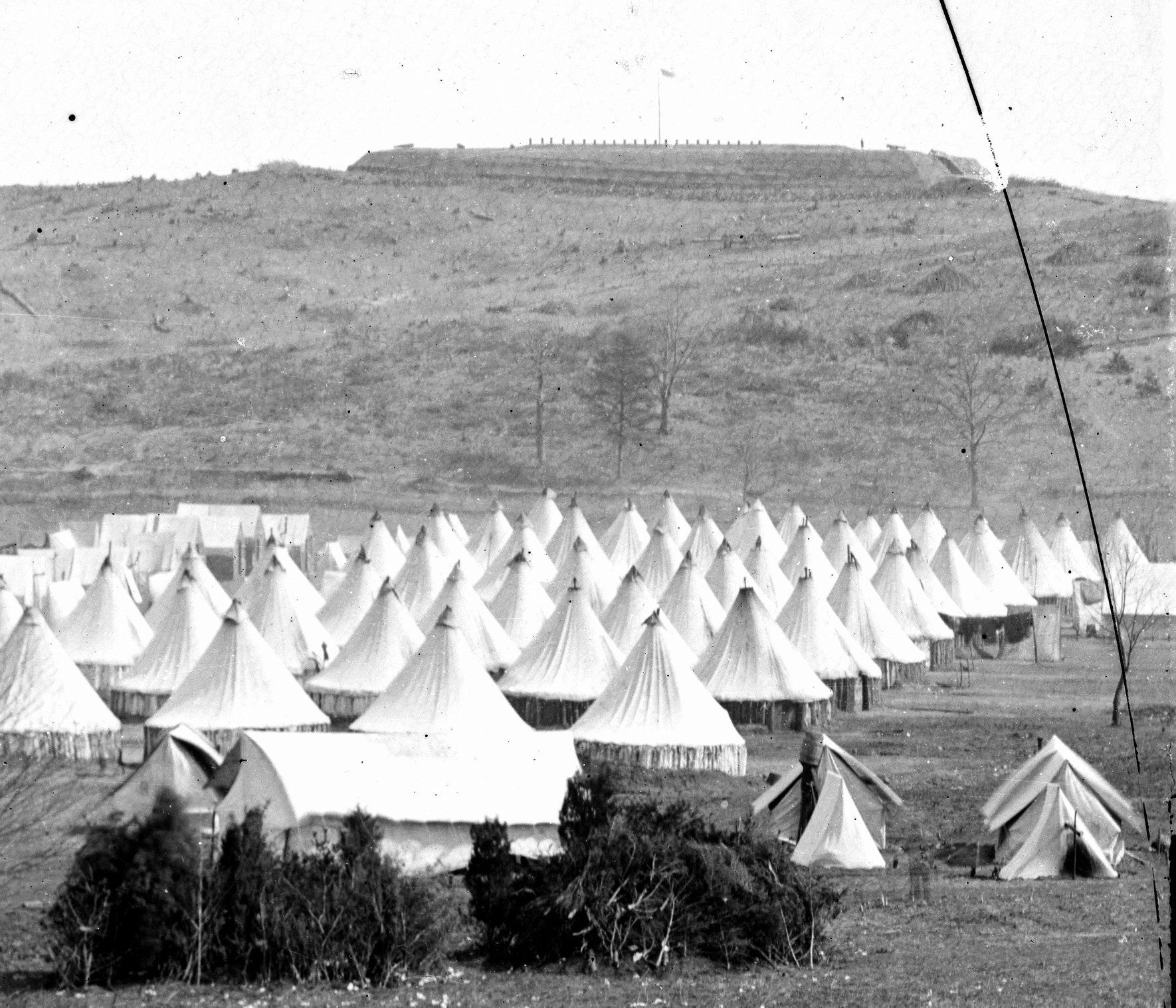Lincoln Visits Fort Corcoran
In his memoir, General William T. Sherman recounts the story of President Lincoln visiting the soldiers of the 69th New York at Fort Corcoran following the defeat at the Battle of Bull Run.

The following account was first published in General Sherman's Memoir in 1889. The story which takes place at Fort Corcoran (located today in Arlington) occurred several days after the Union defeat at Bull Run. The mood was grim and many units were close to mutiny. Sherman describes an encounter he had with an officer of the 69th New York who wanted to leave, and then later a visit by President Lincoln to talk to the troops.
A slow, mizzling rain had set in, and probably a more gloomy day never presented itself. All organization seemed to be at an end; but I and my staff labored hard to collect our men into their proper companies and into their former camps, and, on the 23d of July, I moved the Second Wisconsin and Seventy-ninth New York closer in to Fort Corcoran, and got things in better order than I had expected. Of course, we took it for granted that the rebels would be on our heels, and we accordingly prepared to defend our posts. By the 25th I had collected all the materials, made my report, and had my brigade about as well governed as any in that army; although most of the ninety-day men, especially the Sixty-ninth, had become extremely tired of the war, and wanted to go home. Some of them were so mutinous, at one time, that I had the battery to unlimber, threatening, if they dared to leave camp without orders, I would open fire on them. Drills and the daily exercises were resumed, and I ordered that at the three principal roll-calls the men should form ranks with belts and muskets, and that they should keep their ranks until I in person had received the reports and had dismissed them. The Sixty-ninth still occupied Fort Corcoran, and one morning, after reveille, when I had just received the report, had dismissed the regiment, and was leaving, I found myself in a crowd of men crossing the drawbridge on their way to a barn close by, where they had their sinks; among them was an officer, who said: "Colonel, I am going to New York today. What can I do for you?" I answered: "How can you go to New York? I do not remember to have signed a leave for you." He said, "No; he did not want a leave. He had engaged to serve three months, and had already served more than that time. If the Government did not intend to pay him, he could afford to lose the money; that he was a lawyer, and had neglected his business long enough, and was then going home." I noticed that a good many of the soldiers had paused about us to listen, and knew that, if this officer could defy me, they also would. So I turned on him sharp, and said: "Captain, this question of your term of service has been submitted to the rightful authority, and the decision has been published in orders. You are a soldier, and must submit to orders till you are properly discharged. If you attempt to leave without orders, it will be mutiny, and I will shoot you like a dog! Go back into the fort now, instantly, and don't dare to leave without my consent." I had on an overcoat, and may have had my hand about the breast, for he looked at me hard, paused a moment, and then turned back into the fort. The men scattered, and I returned to the house where I was quartered, close by.
That same day, which must have been about July 26th, I was near the river-bank, looking at a block-house which had been built for the defense of the aqueduct, when I saw a carriage coming by the road that crossed the Potomac River at Georgetown by a ferry. I thought I recognized in the carriage the person of President Lincoln. I hurried across a bend, so as to stand by the road-side as the carriage passed. I was in uniform, with a sword on, and was recognized by Mr. Lincoln and Mr. Seward, who rode side by side in an open hack. I inquired if they were going to my camps, and Mr. Lincoln said: "Yes; we heard that you had got over the big scare, and we thought we would come over and see the 'boys.'" The roads had been much changed and were rough. I asked if I might give directions to his coachman, he promptly invited me to jump in and to tell the coachman which way to drive. Intending to begin on the right and follow round to the left, I turned the driver into a side-road which led up a very steep hill, and, seeing a soldier, called to him and sent him up hurriedly to announce to the colonel (Bennett, I think) that the President was coming: As we slowly ascended the hill, I discovered that Mr. Lincoln was full of feeling, and wanted to encourage our men. I asked if he intended to speak to them, and he said he would like to. I asked him then to please discourage all cheering, noise, or any sort of confusion; that we had had enough of it before Bull Run to ruin any set of men, and that what we needed were cool, thoughtful, hard-fighting soldiers—no more hurrahing, no more humbug. He took my remarks in the most perfect good-nature. Before we had reached the first camp, I heard the drum beating the "assembly," saw the men running for their tents, and in a few minutes the regiment was in line, arms presented, and then brought to an order and "parade rest!"
Mr. Lincoln stood up in the carriage, and made one of the neatest, best, and most feeling addresses I ever listened to, referring to our late disaster at Bull Run, the high duties that still devolved on us, and the brighter days yet to come. At one or two points the soldiers began to cheer, but he promptly checked them, saying: "Don't cheer, boys. I confess I rather like it myself, but Colonel Sherman here says it is not military; and I guess we had better defer to his opinion." In winding up, he explained that, as President, he was commander-in-chief; that he was resolved that the soldiers should have every thing that the law allowed; and he called on one and all to appeal to him personally in case they were wronged. The effect of this speech was excellent.
We passed along in the same manner to all the camps of my brigade; and Mr. Lincoln complimented me highly for the order, cleanliness, and discipline, that he observed. Indeed, he and Mr. Seward both assured me that it was the first bright moment they had experienced since the battle.
At last we reached Fort Corcoran. The carriage could not enter, so I ordered the regiment, without arms, to come outside, and gather about Mr. Lincoln, who would speak to them. He made to them the same feeling address, with more personal allusions, because of their special gallantry in the battle under Corcoran, who was still a prisoner in the hands of the enemy; and he concluded with the same general offer of redress in case of grievances. In the crowd I saw the officer with whom I had had the passage at reveille that morning. His face was pale, and lips compressed. I foresaw a scene, but sat on the front seat of the carriage as quiet as a lamb. This officer forced his way through the crowd to the carriage, and said: "Mr. President, I have a cause of grievance. This morning I went to speak to Colonel Sherman, and he threatened to shoot me." Mr. Lincoln, who was still standing, said, "Threatened to shoot you?" "Yes, sir, he threatened to shoot me." Mr. Lincoln looked at him, then at me, and stooping his tall, spare form toward the officer, said to him in a loud stage-whisper, easily heard for some yards around: "Well, if I were you, and he threatened to shoot, I would not trust him, for I believe he would do it." The officer turned about and disappeared, and the men laughed at him. Soon the carriage drove on, and, as we descended the hill, I explained the facts to the President, who answered, "Of course I didn't know anything about it, but I thought you knew your own business best." I thanked him for his confidence, and assured him that what he had done would go far to enable me to maintain good discipline, and it did.
From the Memoirs of General William T. Sherman, Vol. I
D. Appleton and Company, New York 1889






